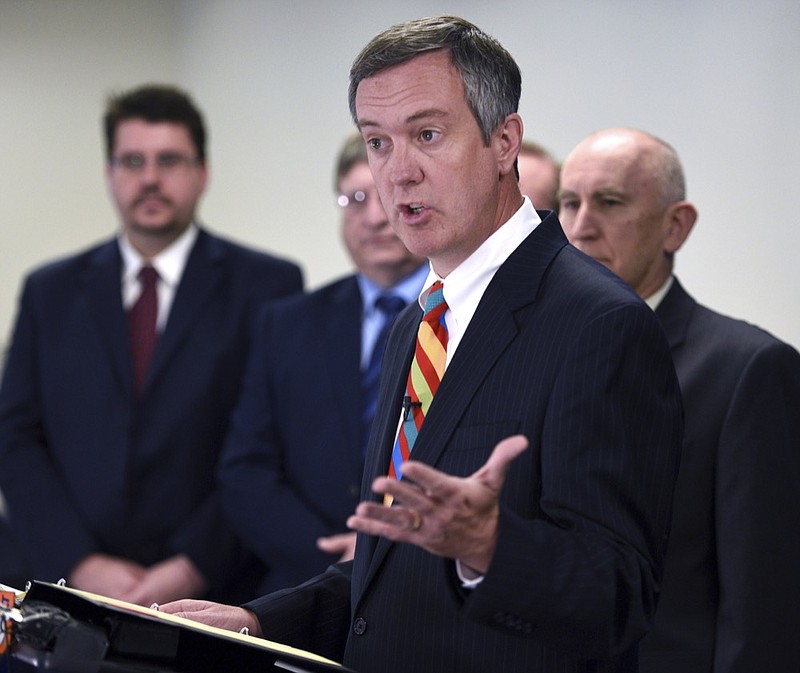NASHVILLE - A federal judge on Thursday temporarily blocked Tennessee's new restrictions on groups involved in voter registration drives from taking effect Oct. 1 as a legal challenge to the law proceeds.
In her 45-page opinion, U.S. District Court Judge Aleta Trauger wrote that plaintiffs challenging the law, pushed by Republican Secretary of State Tre Hargett and approved by the GOP-led General Assembly this spring, are likely to succeed at trial.
"There is simply no basis in the record for concluding that the Act will provide much benefit to Tennesseans, and even less reason to think that any benefit will come close to outweighing the harms to Tennesseans (and non-Tennesseans) who merely wish to exercise their core constitutional rights of participating in the political process by encouraging voter registration," the judge wrote.
The law requires voter registration groups to register and undergo state training. Organizations that pay workers to sign up voters would be subject to fines for submitting too many incomplete registration forms. And some could be prosecuted criminally in some instances, generating an outcry from groups such as the League of Women Voters of Tennessee.
Hargett and state election coordinator Mark Goins insisted the novel restrictions were necessary due to problems in the November 2018 election. They came as Republican election officials in Shelby and Davidson counties complained that they were deluged with tens of thousands of voter registration forms at the last minute before the 30-day deadline on new signups took effect.
It was spurred, in part, by the Tennessee Black Voter Project, which sought to sign up some 90,000 voters last year in one of the largest known drives in Tennessee politics. A number of forms were incomplete or faulty and turned in anyway. Groups said they felt they had no choice but to turn them in due to concerns they could be accused of wrongdoing and suppressing the forms.
Hargett pushed the law in this year's legislative session and it was readily approved by the GOP-led House and Senate.
It has since drawn national attention and criticism.
A spokesman for Hargett did not respond immediately for comment.
In her opinion, Trauger said voter registration drives are a form of speech protected by the U.S. Constitution's First Amendment. Thus, they should be subject to high scrutiny, the judge wrote. And she also said Tennessee has other ways to address perceived problems without imposing strict regulations on people.
Later speaking with reporters, Republican Gov. Bill Lee, who signed the measure into law, said the law "is meant to create free and fair elections and make sure we don't clog the system. But that judge disagrees with that, so we'll see where it goes in court."
Asked if he thought the law imposes an undue burden, Lee said, "I think the law's intended to and will prevent what happened that created the need for that law, the clogging of the system to impact elections in a negative way. But we'll just have to wait and see how it plays out."
He said he has not spoken to Tennessee Attorney General Herbert Slatery about the legal setback and doesn't intend to.
While Hargett isn't commenting, members of the coalition of groups that is suing are.
"Today's ruling indicates that the court understands the dangerous burdens this law places on organizations simply trying to ensure that as many eligible voters can participate in the democratic process as possible," said Hedy Weinberg, executive director of the American Civil Liberties Union Tennessee.
It "allows our clients to continue their important work of registering voters - including those who have been historically disenfranchised - this election season. We look forward to the day when this unconstitutional law can be struck down for good," Weinberg added.
Danielle Lang, co-director, Voting Rights and Redistricting with the Campaign Legal Center, praised the court for moving "to stop Tennessee's punitive law in its tracks. This law punished civic organizations for seeking to help register voters, particularly those in underserved communities. As the court recognized, it struck at the heart of free speech rights and imposed needless and burdensome regulations."
Chris Carson, president of the board of the League of Women Voters of the United States, called it a win for "Tennessee voters, who deserve every possible opportunity to get registered or update their registration."
The case was filed on behalf of the League of Women Voters of Tennessee, American Muslim Advisory Council, Mid-South Peace & Justice Center, Rock the Vote, Memphis Central Labor Council, and Headcount.
Tennessee ranks 44th in voter registration, but during the 2018 midterm election the state saw a surge in registrations.
Contact Andy Sher at asher@timesfreepress.com or 615-255-0550. Follow on Twitter @AndySher1.
